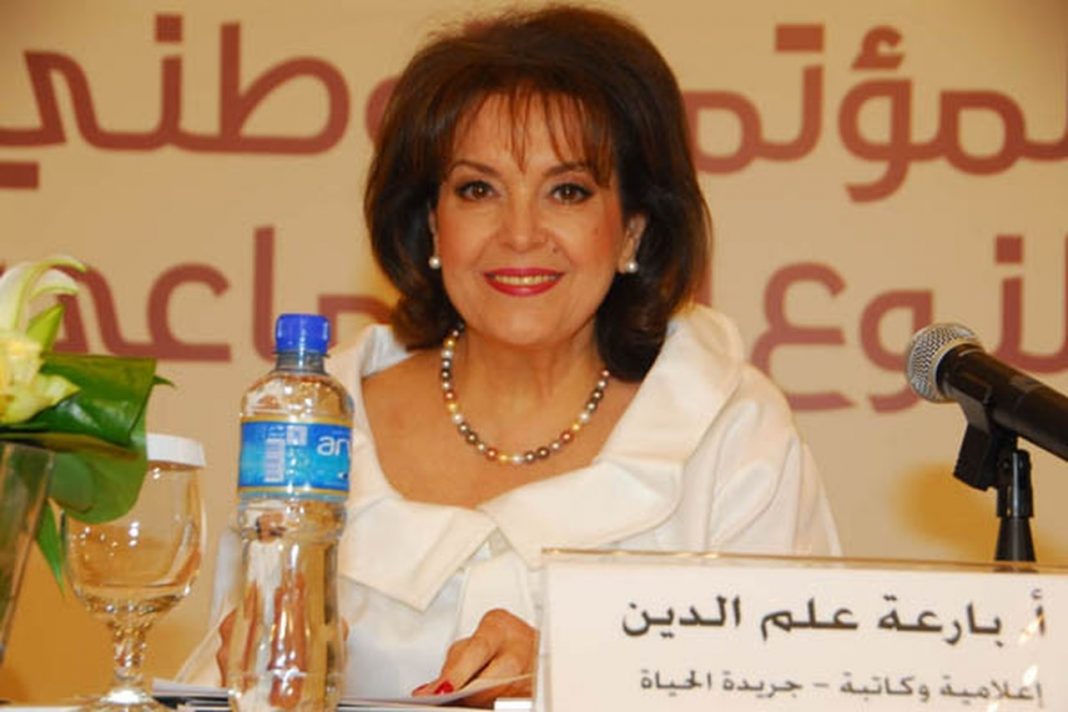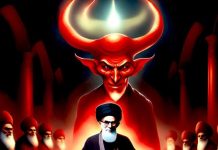Terror-exporting ayatollahs on the threshold of going nuclear
Baria Alamuddin/Arab News/June 28/2020
بارعة علم الدين: الملالي المصدرين للإرهاب أصبحوا على عتبة امتلاك السلاح النووي
After the 2015 deal aimed at curbing its nuclear program, Iran was judged to be a year away from “breakout capacity” — having enough 90 per cent enriched uranium to build a bomb. The latest International Atomic Energy Agency (IAEA) report indicates that Tehran is now less than four months away from breakout capacity, having already stockpiled 1,572kg of low-enriched uranium.
The latest clash at the IAEA was over Tehran’s refusal to cooperate with the agency’s requests to inspect sites believed to have been used before for atomic research, including a testing range for high explosives in central Iran. China and Russia have led the field in blocking IAEA efforts to pressure Iran.
One State Department official accused them of acting as “protectors and enablers” of Iran’s nuclear ambitions.
“What we’re verifying is the gradual diminishing compliance with the agreement we’re supposed to be verifying;” IAEA director-general Rafael Grossi sardonically commented.
European states have supported US efforts to extend a UN conventional arms embargo due to expire in October, with Moscow and Beijing jostling to be at the front of the queue to resume weapons sales to Tehran. This raises the question of where Tehran finds the money to replenish its arsenal, since it already spends billions bankrolling Hezbollah, the Houthis and the Assad regime while ordinary Iranians go hungry.
North Korea is a small, impoverished, failed state, but it must be taken seriously because if provoked it could rain down nuclear and ballistic weapons on its enemies.
A nuclearized Iran would be an infinitely greater menace because of its belligerent position throughout the Middle East; for example, its proximity to three marine global trade chokeholds – the Strait of Hormuz, Bab-el-Mandeb and the eastern Mediterranean.
Although Iran’s recent provocative behavior includes attacking US bases, bombing Saudi Arabia and pursuing supremacy in multiple Arab states, it must nevertheless behave with relative caution because a decisive retaliatory strike by America or Israel would be devastating.
However, a nuclear-armed Iran would fundamentally up-end such calculations, and could deploy its proxies against Gulf states or Western assets with relative confidence that nobody would dare retaliate.
A senior Obama-era official recalled to me that before 2015 the administration “spent half its time trying to convince Netanyahu not to strike Iran … none of us can live with a nuclear Iran”.
Some of US President Donald Trump’s confused attempts to get tough on Iran have produced perverse results, particularly with the cancelation of sanctions waivers for measures under the 2015 deal designed to ensure the use of Iran’s nuclear program for purely peaceful purposes.
This occurred with both the Arak/Khondab heavy-water reactor and the Fordaw site, which, instead of being repurposed for medical or research activities, are now being reconfigured toward unmistakably proliferation-sensitive purposes.
“Soon the international community will witness our new achievements at the Khondab research reactor,” boasted Ali Akbar Salehi, head of the Atomic Energy Organization of Iran.
Likewise, the 2015 deal guaranteed supplies of 20 percent enriched uranium for the Tehran research reactor. This imported uranium was unsuitable for military purposes. The Trump administration’s blocking of these supplies offers the perfect pretext for the regime to return to enriching uranium to 20 percent and beyond, moving us closer to nuclear midnight.
Whoever occupies the White House in 2021, the strategic threat of a nuclearized, expansionist Iran must be policy priority No1.
Even a Biden administration could not simply set the clock back to 2015. A deal would be meaningless unless it addressed Iran’s regional warmongering and vast transnational paramilitary armies, or its recent advances in enrichment technology.
Under the 2015 agreement Iran shipped 97 percent of its low-enriched uranium (enough to make more than 14 bombs) out of the country. Given Tehran’s recent advances we could soon be back to square one — or ground zero!
A senior Obama-era official recalled to me that before 2015 the administration “spent half its time trying to convince Netanyahu not to strike Iran … none of us can live with a nuclear Iran.”
Biden’s foreign policy advisers have grudgingly acknowledged the brute effectiveness of Trump’s sanctions, although they had little appreciable effect on Iran’s rush for a nuclear weapon or its embroilment in militancy and terrorism.
The best prospect for fruitful multilateral efforts against Iran is via Moscow (and to a lesser extent Beijing). Vladimir Putin has made considerable political capital from disrupting Western policy-making, but he faces a quagmire of his own making in Syria, which can be stabilized only by cutting Iran down to size.
Russia and China have most to lose from a belligerent, nuclearized Iran dominating Central Asia.
A senior Russian foreign policy official told me: “We can never live with, or accept, a nuclear-armed Iran.”
Rather than indulge in zero-sum-game one-upmanship, America, China and Russia must find common ground over the challenges of Iran, Syria, Turkish expansionism, North Korea and arms proliferation.
Nobody wants a planet where terrorist rogue states call the shots while so-called world powers are compelled to appease them.
Iran’s leaders may have no intention of actually using such a bomb, but along with ceaseless rhetoric about annihilating Israel, there are numerous scenarios in which the ayatollahs could resort to such an extreme measure, including a scorched-earth policy to prevent client states such as Syria, Iraq or Lebanon falling into the hands of its enemies; a regional conflagration of their own making; or in the face of efforts to bring down the regime itself.
There are also prospects of an accidental nuclear strike or a Chernobyl-style meltdown. This is a basket-case state with an appalling record of plane crashes because of the unavailability of spare parts, not to mention the Revolutionary Guards shooting their own citizens out of the sky.
We await clarification about the huge, mysterious explosion on June 25 next to the Parchin nuclear/military site near Tehran.
As with North Korea, the prospect of crazed, megalomaniacal leaders wielding these weapons of mass destruction prevents the world breathing peacefully.
Iranians, Koreans and rogue Pakistani scientists participate in a shadowy proliferation trade in nuclear and ballistic materials. Iran is already the foremost global state sponsor of terrorism; let’s not allow it to become the principal exporter of nuclear secrets and dirty bombs.
The last thing the conflict-wracked Middle East needs is Tehran triggering a regional nuclear arms race, with the logical end-point being wholesale extermination of countless millions of Iranians, Israelis and Arabs.
If Iran’s priority really is safeguarding its citizens, it must immediately and unambiguously advocate a Middle East entirely free of nuclear weapons —including, first and foremost, Israel.
• Baria Alamuddin is an award-winning journalist and broadcaster in the Middle East and the UK. She is editor of the Media Services Syndicate and has interviewed numerous heads of state.



















